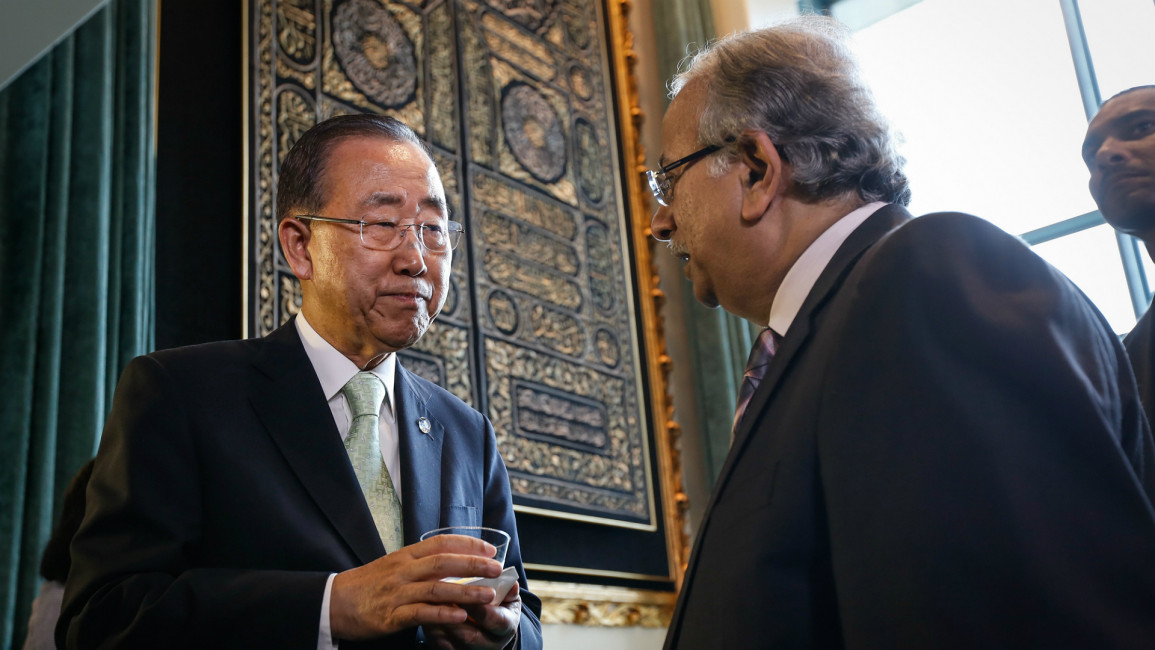UN chief slams Saudi pressure over child rights blacklist
UN Secretary-General Ban Ki-moon on Thursday rebuked Saudi Arabia and its allies for resorting to "undue pressure" to remove the Saudi-led coalition in Yemen from a blacklist of child rights violators, amid Saudi denial.
In his first public remarks about the uproar, Ban said he decided to take the coalition off the list after Saudi Arabia along with other Arab and Muslim countries threatened to cut off funding to UN humanitarian programs.
"It is unacceptable for member-states to exert undue pressure," Ban told reporters at the UN headquarters in New York. "Scrutiny is a natural and necessary part of the United Nations."
The United Nations blacklisted the coalition after concluding in a report released a week ago that it was responsible for 60 percent of the 785 children killed in Yemen last year.
But in an embarrassing climbdown for the United Nations, Ban announced on Monday that the coalition would be scratched from the list pending a joint review with the Saudi-led alliance.
The UN chief came under fire from rights groups who accused him of shamefully bowing to Saudi pressure and damaging the credibility of the United Nations.
"This was one of the most painful and difficult decisions I have had to make," Ban said.
 |
We did not use threats or intimidation and we did not talk about funding - Saudi Ambassador Abdullah al-Mouallimi |
 |
Confirming reports of a threatened cut-off of funding, Ban said he "had to consider the very real prospect that millions of other children would suffer grievously if, as was suggested to me, countries would de-fund many UN programmes."
However, Saudi Ambassador Abdullah al-Mouallimi denied that his government had put pressure on the United Nations to reverse its decision by threatening to cut off millions of dollars in funding.
"We did not use threats or intimidation and we did not talk about funding," said Mouallimi.
UN officials and Security Council diplomats had over the past week confirmed to the press that the Saudis had "whipped up a lot of supporters" to pressure Ban to make the changes, and threatened in particular to withdraw funding from the Palestinian relief agency UNRWA.
The UNRWA, which is a lifeline for hundreds of thousands of Palestinian refugees is already facing a funding crisis that has reduced its services.
"I stand by the report," Ban said, warning that "the content will not change."
The Saudi ambassador maintained that the decision to withdraw the coalition from the list was "final, irreversible and unconditional."
 |
Because of this, you can't burn down the whole house - UN Secretary-General Ban Ki-moon |
 |
Ban acknowledged that "the impression is not a good one" from the decision to de-list the coalition, but he argued that there were more important issues at stake.
"Because of this, you can't burn down the whole house," he said.
The UN chief appealed to member-states to defend the reporting mechanisms such as the children in armed conflict annual blacklist.
The blacklist was established by a Security Council decision in 1999, but the council has been silent on the dispute over the coalition's listing.
The Saudi-led coalition launched an air campaign in support of Yemen's President Abedrabbo Mansour Hadi in March 2015 to push back Houthi rebels after they seized the capital Sanaa and many parts of the country.
The war has killed some 6,400 people, with more than 80 percent of the population in desperate need of humanitarian aid, according to the United Nations.
The controversy over adding the Saudi-led coalition to the blacklist followed a similar uproar last year over the decision to exclude Israel over the deaths of 500 children in the war in Gaza.


![President Pezeshkian has denounced Israel's attacks on Lebanon [Getty]](/sites/default/files/styles/image_684x385/public/2173482924.jpeg?h=a5f2f23a&itok=q3evVtko)



 Follow the Middle East's top stories in English at The New Arab on Google News
Follow the Middle East's top stories in English at The New Arab on Google News


